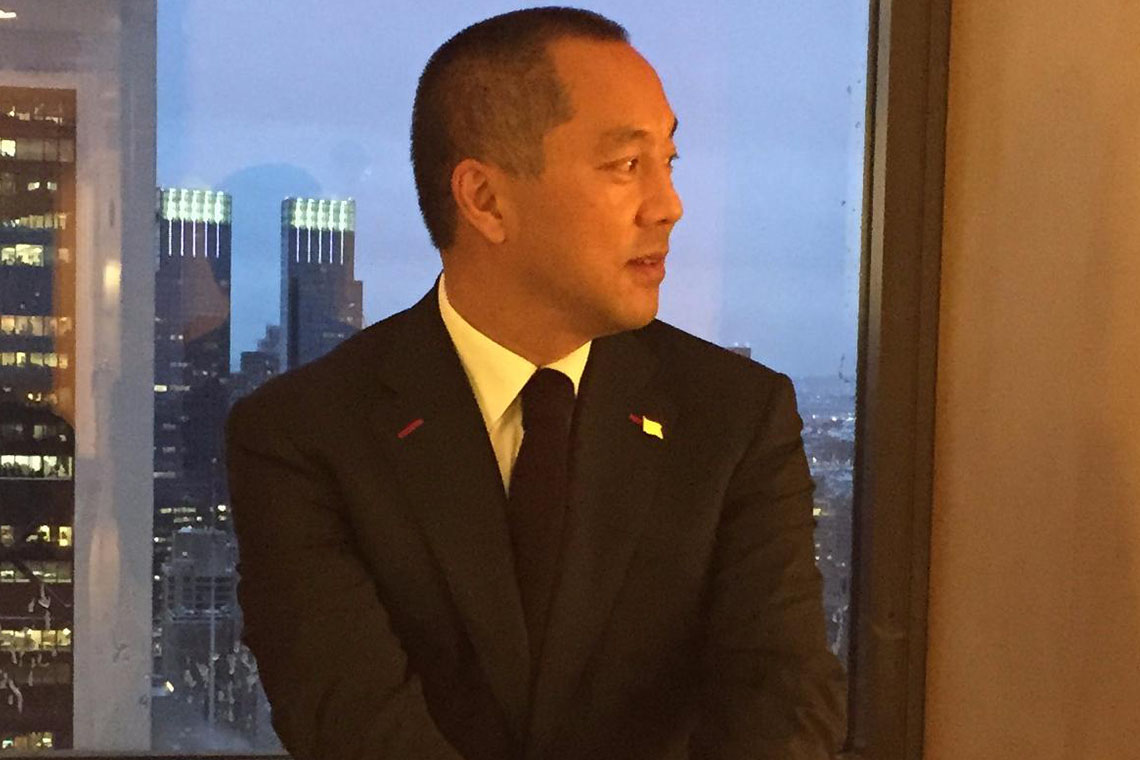Exiled Chinese billionaire is member of Trump’s private club
Top China news for April 5, 2017. Get this daily digest delivered to your inbox by signing up at supchina.com/subscribe.

Could a billionaire fugitive from China make trouble for Xi at Mar-a-Lago?
As Chinese president Xi Jinping wraps up his state visit to Finland (where he agreed to send a pair of pandas) and prepares to fly to Florida for a meeting with Donald Trump, North Korea test-fired a missile into the sea, and the political commentariat is reaching peak frenzy.
Two of the more interesting pieces on the upcoming meeting at Mar-a-Lago are in the New York Times:
- The Times says (paywall) that one of the members of Trump’s private club is Miles Kwok, aka Guo Wengui 郭文贵, a well-connected Chinese billionaire who vanished from public view in 2015, and was reported by some media organizations to have been taken into custody by the police. He subsequently fled to the U.S. In February this year, he reappeared in an online video, and has since been active on Twitter (in Chinese), where he has been badmouthing the Chinese government and attacking Hu Shuli 胡舒立, editor of Caixin magazine, which published a muckraking article (in Chinese) on his business dealings around the time of his disappearance. The Times article quotes Christopher K. Johnson, a former senior China analyst at the C.I.A., on the possibility that Guo might make an appearance during the Xi-Trump meeting: “Guo would certainly be a very disruptive wild card at Mar-a-Lago.”
- Matt Pottinger was a correspondent in Beijing for the Wall Street Journal, which he left to join the U.S. Marines and serve in Afghanistan. He is now working for the Trump administration as “the top Asia policy maker in an administration desperately short of his kind of on-the-ground experience.” The Times profiles him (paywall) approvingly but notes that he is “struggling to navigate the byzantine structure of this White House.”
Property speculation banned, but investors bet on planned new city
On Monday, we noted the government’s announcement of the Xiongan New Area (雄安新区 xióng ān xīnqū), a city to be created by fiat about 100 kilometers (62 miles) southwest of Beijing, intended to alleviate overpopulation in the capital and stimulate economic growth in northern China. The announcement caused an immediate boom in property sales that alarmed the government, resulting in a suspension of real estate transactions. But the ban does not apply to stocks: Caixin reports that “dozens of China-listed companies saw their share prices soar when trading resumed Wednesday after a three-day break as investors bet on stocks they believe will benefit from a new economic zone.”
The government does not seem to know quite what to make of it. On the one hand, a stated purpose of the new area is to unleash innovation and entrepreneurship, but there are apparently limits to how much freedom the market will have in the Xiongan New Area. As a rather confused editorial in the Party mouthpiece the People’s Daily says (in Chinese): “From ancient to modern times, in China and abroad, you cannot just allow the ‘invisible hand’ of the market to rule when developing a capital [city or district]; a metropolis needs the government’s scientific planning.”
U.S.-China agricultural trade
American farmers have done well from trade with China in recent years, but there are signs of problems to come. On The China Project, Michelle Winglee asks, Is America’s bright spot in agricultural trade with China fading?
‘Paywall’ or no ‘paywall,’ ‘in Chinese’ or not
Thanks for reading, and as always, send me your feedback by replying to this email. Today I’d like to ask if you like the way we label paywalled articles “(paywall)” and also if you prefer us to label links to Chinese sources “(in Chinese)” or not.
—Jeremy Goldkorn, Editor in Chief
Today on The China Project
Presidents Trump and Xi will meet for the first time this Thursday, but their rhetoric suggests they might not see eye-to-eye. Jia Guo has a quick video comparison of the two sides.
To address misunderstandings and intolerance between the U.S. and China, Jiani Liu founded a group connecting millennials from both countries. Read more about her organization, Millennials of U.S.-China.
This issue of the The China Project newsletter was produced by Sky Canaves, Lucas Niewenhuis, Jia Guo, and Jiayun Feng. More China stories worth your time are curated below, with the most important ones at the top of each section.
BUSINESS AND TECHNOLOGY:
Fake ratings and a scarcity of A-listers plague the entertainment industry
Caixin reports today on the troubles of the Chinese entertainment industry as production costs skyrocket even as low-quality programs flourish. One media executive in the report criticized what he called “fast-food productions” — TV series and films that pay exorbitant prices for a few overbooked actors to read off a formulaic script — for cutting corners and flooding the market with substandard products. One recent big-budget series called General and I (孤芳不自赏 gū fāng bù zì shǎng) apparently had such trouble getting studio time for its big-name actors that it hastily green-screened their performances together, leading 69 percent of users of the Chinese arts and culture website Douban to give it a one-star ranking.
The obsession with making money in entertainment, rather than producing quality content or a dedicated fan base, has led to another problem. According to industry insiders, up to 90 percent of TV audience rating numbers are fake, so broadcasting fees have become inflated to the point that studios now pay up to 9 million yuan ($1.3 million) to distribute a single TV episode.
- HNA group continues overseas acquisition spree / Caixin
Conglomerate HNA Group, owner of businesses such as Hainan Airlines and GE Seaco, was undeterred by currency controls this past week as it planned a majority stake purchase in commodities giant Glencore for $775 million. - Why China’s got beef with U.S. beef / Bloomberg
“More than six months after China promised to end a ban on American beef imposed in 2003 after a case of mad-cow disease, U.S. producers still aren’t selling to Chinese consumers.” - U.S. shows China how the sausage is made / WSJ (paywall)
“Even as China scrutinizes overseas investments because of concerns about outflows, deals that modernize the agricultural industry will remain a priority for now.” - Trump administration quietly starts review of China’s trade status / NPR
- Trump officials alarmed Chinese may bid for Westinghouse unit / Bloomberg
- Chinese finance is storing up trouble for the rest of the world / Financial Times (paywall)
- Chinese stocks are becoming a world-beating dividend play / Bloomberg
- Wanda’s $8 billion China studio offers unique Hollywood incentive / Hollywood Reporter
- Kenya’s $4 billion railway gains traction from Chinese policy ambitions / Financial Times (paywall)
POLITICS AND CURRENT AFFAIRS:
Americans’ views of China have grown more positive
A new report from the Pew Research Center shows that Americans view China significantly more positively now than a year ago, and that the increases are not limited to the young and liberal: 39 percent of Republicans have a favorable opinion of China, up from 27 percent a year ago. Overall, opinions remain mixed, though Pew reports that “concerns about U.S. debt, job losses, and trade deficits have generally eased” as the American economy has continued to gain strength. For example, while 61 percent of Americans in 2012 considered the trade deficit with China to be a very serious problem, only 44 percent think so today.
Nevertheless, Pew notes a significant partisan divide: “Most strikingly, 71% of Republicans say job losses to China are a very big problem for the U.S., compared with only 47% of Democrats.” Trump’s harsh rhetoric on China may be best understood, then, as a reflection of Republican voters rather than the American public at large.
- China’s ‘House of Cards’ hits the TV screen as Xi Jinping whips his cadres / SCMP
In the Name of the People (人民的名义 rénmín de míngyì), a new TV series that premiered on March 28, was produced by the Supreme People’s Procuratorate (SPP). The show features guns, bedrooms piled high with cash, officials in bed with foreign mistresses, and a crack team of investigators rooting out corruption at the highest levels of government. The show has been very well received. You can watch a trailer for it here. - Any check on North Korea has to involve China: U.S. general / Reuters
- Trump and Xi: Two imposing leaders with clashing agendas / NYT (paywall)
- Russia is trying to copy China’s approach to internet censorship / Slate
- China is about to change the way it uses a last-resort antibiotic for the better — but it’s too late / Quartz
SOCIETY AND CULTURE:
Court orders Beijing subway to pay 260,000 yuan to paralyzed commuter
A court in Beijing’s Changping District has ordered operators of the city’s subway system to award 260,000 yuan ($37,700) in compensation to a man who ended up paralyzed in an accident during the morning rush hour. In January 2014, the 55-year-old man was pushed into a train at Tiantongyuan Station, hitting the door on the other side of the train. He lost the use of limbs and sued Beijing Mass Transit Railway Operation Corporation, as well as the direct operator of the subway line, a different company. The court said the companies were negligent in providing “reasonable safety protection” to passengers during rush hour even if they were not the direct causes of the accident. There is an English report on the case on ECNS.cn and a longer Chinese report on Toutiao. You can find some of the social media commentary below the Toutiao article. Comments include comparisons with Japan — “Just as crowded, but the people are polite so no one gets crushed” — criticism of government officials who never use public transport, and advice to ride a bike instead.
- Chinese Travelers More Likely to Visit the United States Under Donald Trump / Jing Daily
- Nearly 14.56 million Chinese honor deceased during Tomb-Sweeping holiday / Xinhua
- As Chinese honor dead ancestors, illegal practice of ghost marriages still lingers / SCMP
- Young Chinese helping sticky rice balls make a comeback / China Daily
- China’s Lin Dan is the bad boy of badminton / ESPN






